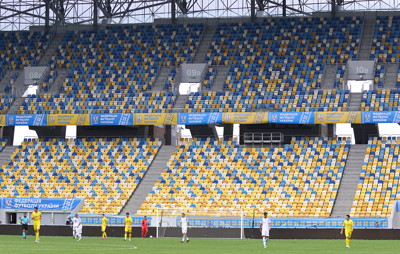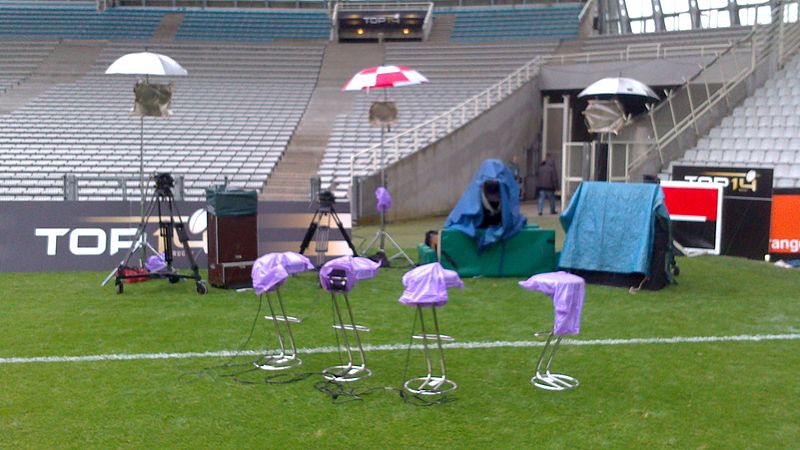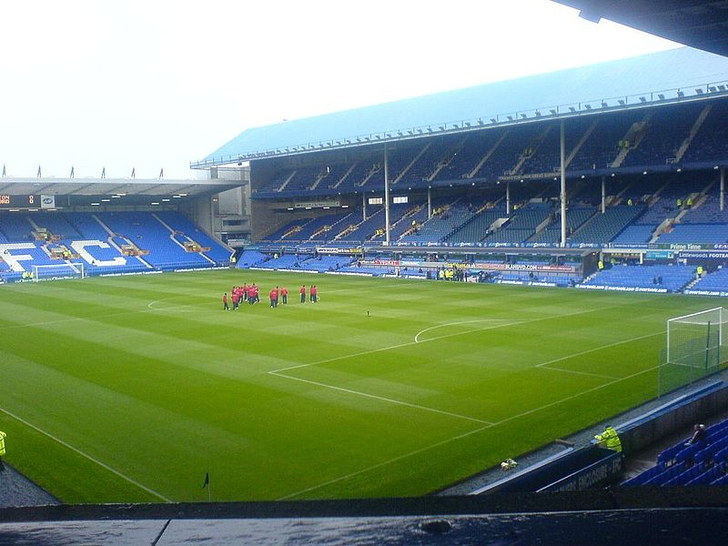 The very notion of playing an important football match without supporters seems odd.
The very notion of playing an important football match without supporters seems odd.
In the United Kingdom, the idea that ‘Football Without Fans Is Nothing’ has been used by supporters to argue against ever-increasing prices to attend matches, for example.
The crowd adds the atmosphere and changes it from a kickabout between mates to a serious and important game.
What sort of a difference does not having a crowd make to football matches? Can it influence results? Given that football started off originally as just a sport and has developed to include large crowds since, is it actually true that without people watching it becomes ‘nothing’? What are the pros and cons to not having people in a stadium when a match takes place?
Reasons For No Supporters In Stadiums
 There can be a host of reasons why there might be no supporters inside a stadium to watch a football match being played. In recent years the likes of FIFA and UEFA have used the punishment of having no crowd as an entirely pointless disincentive for racist behaviour, as an example. Similarly violence from supporters, though rare, has led to crowds being banned.
There can be a host of reasons why there might be no supporters inside a stadium to watch a football match being played. In recent years the likes of FIFA and UEFA have used the punishment of having no crowd as an entirely pointless disincentive for racist behaviour, as an example. Similarly violence from supporters, though rare, has led to crowds being banned.
When the 2019-2020 football season was stopped around Europe as a result of the global health crisis, the only way the football was able to return was with no people in the stadiums watching. That might well be an extreme example, but it is indicative of one of the myriad of reasons for matches to take place with no one there to watch them play out.
In 2018, the England international side travelled to Croatia to play a Nations League game that was behind closed doors. In that instance the punishment was handed out after a Swastika had been marked on the pitch prior to a Euro 2016 qualifying match against Italy. They were banned from having supporters in the ground for two games, with the first played in 2015 and then the next home game being the one against England.
Three years before the England game against Croatia, Club Brugge and Napoli had to play their Europa League game behind closed doors after Belgium, the home club’s nation, had been the subject of a number of terrorist alerts. It’s one of the odder reasons for a game to be played without fans, but it’s far from the only one. Stadium safety issues as well as an attempt to avoid clashes between particularly rival supporters are also reasons to remove supporters.
Arguably the most bizarre examples of a match being played out behind closed doors happened in 2017. Leyton Orient were playing host to Colchester, having already been relegated. Fans invaded the pitch after 85 minutes in protest at the owner and refused to leave for more than an hour. Eventually they were all moved out of the stadium after being told the game had been abandoned, only for the reams to sneak back out to finish the match in front of no one.
The First Game With No Supporters

The exact history of behind closed doors matches is difficult to trace. Obviously there will have been plenty of matches in football’s more formative years that had no supporters in attendance on account of the fact that nobody knew what football was, but that’s not the sort of thing that we’re talking about here.
The earliest example we’ve been able to find of a match played without supporters featuring an English club that would normally have seen thousands of people in attendance occurred in 1980. West Ham United were playing against Real Madrid’s Castilla side in the UEFA Cup when trouble flared in the first-leg. In excess of 50 Hammers fans were ejected from the Bernabeu for violence.
As a result, UEFA decided that there would be no supporters allowed to watch the return leg between the two clubs. Not only that, but it wouldn’t even be played in West Ham’s stadium in order to avoid people turning up to watch it, instead moving the match to Roker Park in Sunderland. West Ham appealed that and in the event it was just played behind closed doors.
Having lost the first-leg 2-1, West Ham went 3-0 up and looked to be progressing only for Bernal to pull one back for Castilla. This was before the days of the away goals rule, so the match went to extra-time. West Ham scored twice more and settled the tie, but the eerie experience was one that the players will never forget having taken part in.
What made matters worse for the West Ham supporters was the fact that UEFA rejected appeals to have the match streamed to local cinemas were fans could watch it. Instead, they just had to wait nervously for news about the full-time score and to find out whether the club had progressed to the next round of the competition or not. As a punishment, it was impressive.
Does It Affect Results?
 One of the obvious questions that would be asked by football supporters is whether or not matches being played without fans inside the ground can affect the result. Many teams would argue that they don’t want to play matches behind closed doors because it means that they’ll lose their home advantage, but is that actually true?
One of the obvious questions that would be asked by football supporters is whether or not matches being played without fans inside the ground can affect the result. Many teams would argue that they don’t want to play matches behind closed doors because it means that they’ll lose their home advantage, but is that actually true?
In 2016 Liverpool were playing a Premier League match against Sunderland and had taken a 2-0 lead in the game. In the 77th minute, thousands of supporters stood up and left the ground, with the world-famous Kop singing chants of ‘you greedy bastards, enough is enough’. The decision to leave the stadium wasn’t take lightly but was done in protest at planned ticket price rises.
The 77th minute was chosen because that was the amount that the most expensive non-corporate match ticket was going to be, increasing from £59. There were 44,179 people inside the ground at kick-off, with around 10,000 leaving as part of the protest. Liverpool ended up drawing the game 2-2, lending credence to the idea that supporters really do make a difference.
Of course, the likelihood is that it was the fuss caused by the protest that shifted the game in favour of Sunderland rather than the fact that fewer supporters were in the ground, even if protesting was the right thing to do. Whilst there’s no question that playing at home does make a difference in terms of results, is it as important as some people claim?
A look back at every result in the Football League between when it started and July of 2017 showed that home advantage had been on a steady decline for decades. The peak for home wins came in the 1895-1896 season when 64.5% of games were won by the home team. That was out of 480 games played across the top two tiers in England.
By the 2015-2016 season, however, that had dropped to 41% across the 2,036 games played in all four tiers of professional football in England. At the same time, the away win percentage sat at 31.5%, which was an all-time high. The number of home wins drop down the deeper into the Football League you go, with League Two sides winning just 40% of their games.
Obviously that’s far from definitive, but it does suggest that the idea of home advantage is overplayed by some in order to argue against the idea of playing behind closed doors. It means it is perhaps not as much of a punishment as the likes of UEFA might wish to think. Playing at home where you know the dressing rooms and layout is important, but having fans there on your side might not be.
Pros & Cons Of Behind Closed Doors Matches

Whilst playing without fans in stadiums is far from ideal, it does throw up the idea that there might be some positives to take from it. That being said, for every positive there is always a negative to sit alongside it! The first thing in the positive column is the fact that crowd trouble will be non-existent, which can only be seen as a good thing.
The reality is that football is a sport that has a bad reputation because of hooliganism that hasn’t really been present in the English game for decades. As an example, there were 1,381 football-related arrests during the entirety of the 2018-2019 season. When you consider that Old Trafford welcomed an average of 74,879 per home game that season, it really is a minuscule percentage of supporters.
Even so, playing matches out behind closed doors will reduce the number of people that behave inappropriately to close to zero, even if some people do decide to be a bit stupid and turn up at the grounds anyway in the hope of seeing players or perhaps even being allowed into the ground, as unlikely as that is to happen.
The cons of playing behind closed doors are numerous, with the lack of atmosphere being an obvious example. People that have watched such a match describe it as a weird experience, with matches often being referred to as ‘ghost games‘ because of the fact that virtually no one was there to see it happen.
When the Premier League was confronted with the possibility of matches without supporters in 2019-2020, plans were made to pipe the noise of fans into the stadium to make the entire experience less weird for the players. It was also considered that the stadium could be ‘dressed’ to remove the oddness of them being empty for the games.
Though West Ham’s match against Castilla all those years ago wasn’t allowed to be shown on TV or in cinemas, most football matches in the present day would be broadcast even if supporters aren’t at the stadiums to watch them play out. That means that the calls and shouts between players could be heard, with swearing not an unusual thing for players to do.
Obviously young children are likely to watch such matches, so the industrial language, which is often used by the participants, being broadcast into homes around the world is a certain con. Equally the tactical instructions being given by managers could be more easily overheard by the opposition than if there was a full and noisy stadium.
How Many People Are Needed For A Match Behind Closed Doors?

The final thing to look at is the number of people required in order for a behind closed doors match to take place. It might seem like a relatively simply thing to sort, but that isn’t quite true. Whilst plenty of the ephemera around a football match is disposable, lots of it most certainly isn’t. That is especially the case if you want to make it a professional experience for the players.
Take ball boys and girls, for example. They might seem entirely unnecessary, but if you leave it to the players on the pitch to recover the ball when it is kicked up into row 52 of the stand then you’re presenting them with a perfect chance to waste time. In fact, ball boys and girls are even more important without fans as they will need to fetch the ball from the stands as there will be no crowd to throw it back. Similarly there may not be a need for stewards, unless they are used for ball fetching, but medical personal will certainly need to be present in case of injuries.
Whilst it isn’t important to have a representative of every single newspaper in the country at a stadium to write about a game, there do need to be some members of the press and media in order to make sure that the match can be broadcast to the outside world. The officials will also need to be present in order to take charge of the match, obviously.
Safety officers must be present if a stadium is being used, with the larger the stadium resulting in more being required than at smaller venues. Then there’s the likes of physiotherapists, analysts, club doctors and ground staff who all need to be present. Even for the broadcast you’ll need the likes of electricians, riggers and camera operators to be there.
It is estimated by some that as many as 200 people will be needed for a match behind closed doors, especially at the larger stadiums around the country. It is not even close to being as simple as just asking the players, management and officials to turn up and then have a kickabout, even if you strip the numbers present down to the bear essentials.
